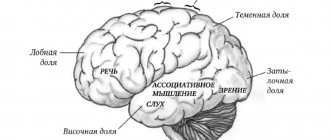“If you don’t value yourself highly, the world won’t offer you a penny more.”
Low self-esteem is when a person thinks of himself worse than he really is. Unhealthy criticism gives rise to a lot of complexes and pulls you down, preventing you from achieving heights in your career and building normal relationships with others. When neglected, this leads to autism, loneliness, mental disorders of personality and behavior, and suicide. You need to know your enemies by sight - let’s see what this phenomenon is and how to prevent it from taking over your inner world.
What affects self-esteem
The way a person perceives his own personality is influenced by both innate (unchangeable) and acquired factors. Among the components that serve as the foundation for the formation of an individual’s self-esteem are the following circumstances:
- genetic component (favorable or unfavorable heredity);
- an innate personality trait – temperament;
- accentuation of character (dominant traits);
- life experience;
- age;
- state of physical and mental health;
- predominant thinking style, typical thoughts;
- optimistic or pessimistic assessment of the past, present, future;
- social circumstances;
- typical reactions of others (praise, criticism);
- results of comparing yourself with other people.
An important note is that self-esteem is not a fixed and static construct. This is a malleable and changeable psychological phenomenon, that is, anyone can correct it.
Factors that influence self-esteem
Psychologists have established and described a number of conditions that have a direct impact on the quality of the subject’s perception of his “I”. The list included factors:
- Commitment to the role of spouse and parent is directly related to self-esteem (Reitzes & Mutran, 1994).
- The employee’s identity with the social unit influences the degree of self-esteem (Reitzes & Mutran, 2006).
- Married status and age over 40 contribute to lower self-esteem (Reitzes & Mutran, 2006).
- Higher education and high income provide higher self-esteem (Reitzes & Mutran, 2006).
- Low socioeconomic status and low self-esteem are directly related (Wagner, Hansen, & Gerstorf, 2018).
- Living alone and not having a significant other leads to low self-esteem (vanSoest, 2018).
- Unemployment and disability contribute to decreased self-esteem (vanSoest, 2018).
- Personal maturity and emotional stability ensure an adequate opinion of oneself (vanSoest, 2018).
- Placing high importance on the opinions of friends and family members about appearance, habits, and character has a negative impact on self-esteem (Chang & Suttikun, 2017).
Diagnostics
There are three ways to understand that you have low self-esteem.
Method 1. Observation and self-analysis
Carefully study the possible causes. Analyze whether they took place in your life. If there are at least 3 of them, there is every chance of being in the risk group. Next, look through the list of symptoms and cross out those that you do not experience. People who are unsure of themselves cope with this part of the task with flying colors, as they practically do not cross out anything. This is confirmation of the diagnosis.
Method 2. Test
Take one of our many self-assessment tests. If you choose the online option, it must include the author of the method and he must be well-known in psychology. Recommended: Rosenberg, Zang, Leary, Budassi, Dembo-Rubinstein, Cattell, Eysenck, Schur.
Method 3. Consultation with a psychologist
It is recommended to take the same tests from a practicing psychologist. He will select one of the best options, be able to prepare you for its implementation, correctly interpret the results, and at the same time tell you how to deal with the problem. In especially severe cases (in cases of underestimation with personality and behavior disorders, manic-depressive psychosis), he can give a referral to a psychotherapist.
What distinguishes self-esteem from other human traits and conditions?
Despite the similarity of concepts, psychologists distinguish the phenomenon of self-esteem from other similar traits, qualities and states.
Self-perception and self-esteem
A term similar to self-esteem is self-perception (Self-image). It is similar to self-esteem in the sense that it all depends on how a person sees himself as a person and how he perceives himself (McLeod, 2008). However, rather than being grounded in reality, self-perception may be based on false and inaccurate thoughts about oneself. An individual's self-image may be close to reality or far from it, but in general it does not fully correspond to the objective picture or how others perceive the person.
Self-respect and self-esteem
Self-esteem is a concept similar to self-esteem, but with a slight (though important) difference. Self-esteem is what a person thinks and feels about himself, while self-esteem is the more global recognition that he is a valuable person worthy of attention, respect, and love (Hibbert, 2013).
Self-confidence and self-esteem
Self-esteem is not self-confidence at all. Self-confidence is the trust in oneself and the ability to cope with challenges, solve problems, and successfully interact with the world (Burton, 2015). Self-confidence is based more on external indicators of success and value than on internal indicators that contribute to self-esteem. It is possible to have high self-confidence, especially in a particular area, but still lack a healthy sense of overall self-worth.
Self-efficacy and self-esteem
Like self-confidence, self-efficacy is also related to self-esteem, but has a number of differences. Self-efficacy refers to an individual's belief in one's own ability to achieve success in certain tasks (Neil, 2005). An individual may be high in self-efficacy when it comes to playing volleyball, but have low self-efficacy when it comes to doing well in math. Unlike self-esteem, self-efficacy is more specific than global and is based on external success rather than intrinsic value.
Self-compassion and self-esteem
Finally, self-esteem is not self-compassion either. Self-compassion focuses on how we feel about ourselves rather than how we judge or perceive ourselves (Neff). Being self-compassionate means that a person is kind to himself and forgiving himself, that he avoids being harsh or overly critical of himself. Self-compassion can lead to a healthy sense of self-worth, but it is not self-esteem in and of itself.
Social environment
This is a common cause of low self-esteem in women and men, even in adulthood. If you are constantly surrounded by people who do not have specific goals and desire for life, then you are unlikely to want internal transformations. Ambition and high self-esteem appear when there are role models. If all your acquaintances and friends prefer to live in the shadows, without showing any initiative, then you will most likely be satisfied with such an existence. But it is worth understanding that laziness and low self-esteem are continuously linked to each other. Therefore, it is worth thinking about whether we need such acquaintances who do not strive for anything, only complain about life, philosophize excessively for no reason and condemn others. Such people are considered energy vampires who hinder the awakening of true potential. As soon as you change your environment, your self-esteem will immediately increase. It is better to communicate with those who are successful, know how to earn money and enjoy life.
Signs of adequate self-esteem
There are certain characteristics that distinguish a person’s adequate self-esteem. Examples of these descriptions are:
- openness to constructive criticism;
- admitting mistakes made;
- ease of giving and receiving compliments;
- demonstrating harmony between what a person says and does.
People with true self-esteem are not afraid to show their curiosity and discuss their experiences, ideas and opportunities. They enjoy the humorous aspects of their lives and feel confident in their social roles.
Individuals with adequate self-esteem value themselves and other people. Enjoy personal development and growth. Find satisfaction and meaning in their lives. Able to recognize their experiences. They are creative individuals. They find their own solutions to problems and have personal opinions.
They accept other people for who they are while pushing them towards a more positive state. They can easily focus on solving problems in their lives. Have friendly and respectful relationships with others. Such persons express their point of view calmly and kindly. They openly share their wants and needs with others.
Based on these characteristics, here are some good examples of what adequate self-esteem looks like.
Imagine a high-achieving student taking a difficult exam and receiving a failing grade. If his self-esteem is correct, he is likely to attribute his failure to factors such as not studying the material hard enough, especially a difficult set of questions. That is, the student does not come to the conclusion that he is stupid and, most likely, will also fail all future tests. Having a healthy sense of self-worth leads to accepting reality, thinking critically about why one failed, and solving problems instead of wallowing in self-pity and giving up.
As a second example, think about a young man on a first date. He really likes the cute woman he's dating, so the guy wants to make a good impression. In the process of communication, he learns that the lady is guided by completely different values and has a completely different taste. Instead of agreeing with her expressed opinions, he offers his own views, he is not afraid to object to her. His adequate self-esteem helps him stay true to his values and allows him to easily communicate with others, even when they do not agree with his opinions. It is more important for him to behave naturally than to focus on making a good impression.
Listening to Affirmations
This is a short phrase that represents a verbal formula. When repeated many times, an attitude is fixed in the subconscious that helps improve the psycho-emotional background. This is one of the effective ways to correct low self-esteem. It is important to formulate affirmations as a fait accompli. This forces a person to take them for granted and think accordingly. If you subconsciously want to be confident in yourself, then gradually you will become so.
Typical examples of af, “I am successful,” “Everything comes to me freely and effortlessly,” “I have everything I want,” “I am a strong woman,” “I am loved and respected.” These formulas need to be repeated out loud on your own throughout the day. You can also make a recording of motivating affirmations and listen to them on your player.
Signs of high self-esteem
There is also the opposite phenomenon – inadequately high self-esteem. The fact that people have an inflated opinion of themselves is evidenced by the following factors. This kind of person:
- becomes angry and quickly gets irritated if others do not agree with his position;
- convinced that only his opinion has significance;
- is immensely in love with himself and hates those around him;
- everything he does he considers right;
- insensitive to the opinions of others;
- takes risky actions without thinking about the consequences;
- careless, convinced of his complete safety;
- does not weigh the pros and cons before making a decision;
- rarely sad and yearning;
- often feels an increased joyful, cheerful mood that does not correspond to objective circumstances;
- easily makes new contacts, gathering flattering “admirers” around him;
- avoids communicating with people whom he classifies as “lower class”;
- pays a lot of attention to extolling his virtues;
- confident in his exclusivity;
- without hesitation, demands that others satisfy their own needs;
- often compares himself with others and finds himself to be the best.
Change of environment
Since man is a social being, he is highly dependent on his environment. Therefore, it will have to be changed if you need to improve low self-esteem. As already mentioned, communicating with lazy, lethargic, unambitious and lacking initiative people leads to a lack of self-confidence and motivation in life.
Contact with prosperous and successful individuals will help you learn to value individuality, find purpose, treat your personal time differently, and achieve success. Self-respect and self-love will gradually return.
Surprising Facts About Self-Esteem
To understand how important adequate self-esteem is, psychologists recommend studying the facts obtained as a result of large-scale sociological research. Below is a list of some of the most important and significant findings.
Teenage boys with high self-esteem are almost 2.5 times more likely to start having sex earlier than boys with low self-esteem. At the same time, girls with high self-esteem are 3 times more likely to delay the start of sexual activity than girls with a bad opinion of themselves.
Low self-esteem is closely associated with violence, teenage pregnancy, suicide, and low academic achievement.
About 45% of girls and 15% of boys in high school believe that their weight is not up to standard and try to lose weight, driving themselves to anorexia.
Seven out of ten girls believe that they are not good enough and do not meet the ideals of beauty, which leads them to prolonged depression.
The absence of a father in the family, poverty and an unfavorable home environment negatively affect self-esteem.
Excessive guardianship of the child, the parents fulfilling all his desires becomes the basis for an inflated opinion of themselves.
People with inadequately high self-esteem cannot create normal relationships with the opposite sex. They are prone to bullying their other half. They are more likely than others to divorce their spouse at the initiative of their partner.
These facts about inadequate self-esteem are alarming and depressing, but fortunately they do not represent the whole picture. There are many people with a healthy sense of self-esteem, and they reap great benefits. Persons with an adequate perception of their own “I”:
- Less critical of themselves and others.
- Can cope with stress effortlessly and avoid the harmful side effects of stressful situations.
- They are less likely to develop eating disorders.
- Less likely to feel worthless, guilty, or useless.
- More likely to be assertive in expressing and getting what they want.
- Capable of building strong, honest relationships.
- They can make the right decisions.
- Able to bounce back quickly when faced with disappointment, failure and obstacles.
Causes
It is important to understand where low self-esteem comes from: without identifying the true reasons, it is difficult to correct anything. A person is not born with it. It is formed over the course of life under the influence of people and external circumstances, only aggravated by some personal traits. Psychologists call the following the most common provoking factors:
- the experience of defeat, when every failure is perceived as a personal tragedy;
- guilt;
- procrastination;
- rejection by parents and peers in childhood, which leads to early psychological trauma, which is considered one of the deepest;
- the presence of a manipulator in the environment;
- perfectionism - a painful desire for perfection, inflated demands on oneself, the desire to live up to the ideal;
- loneliness;
- dependence on the opinions of others;
- laziness;
- flaws in appearance;
- fear of the future, constant doubts, uncertainty.
In men, it is most often formed as a result of lack of recognition in society and lack of career growth. For women, because of their appearance, if it does not meet the imposed standards of beauty. In a child, due to a lack of parental love at a young age, failures at school and lack of attention from peers at a later age.
If the reason lies in external circumstances or the person himself, it is easier to get rid of low self-esteem. Much more complex are cases when there is a hidden manipulator in the environment. It can take psychologists several weeks to identify it because it is usually idealized by the patient himself.
Most often, parents or husband/wife underestimate self-esteem, less often - a friend, colleague or boss. If this happens in childhood, the trauma remains for life. Such a child grows up to be autistic, neurasthenic, downtrodden and insecure.
A father or mother can take out their failures in life on the child. For some parents, the only opportunity to achieve success is to put pressure on someone who depends on you and cannot fight back.
One of the spouses humiliates the other because of their own childhood traumas. If you do not confront him, you may need the help of a psychotherapist in the future.
How to get rid of high self-esteem
Self-esteem researchers have provided practical advice on how to build good self-esteem and develop a healthy sense of self-worth. These include the following recommendations:
- Write down 10 strengths and 10 weaknesses. This will help you begin to develop an honest and realistic view of yourself.
- Set realistic expectations. It is important to set small, achievable goals that are within your control. For example, having extremely high expectations will virtually guarantee that a person will become a failure.
- Stop being a perfectionist. Recognize your achievements and mistakes. Confidence in your perfection will only lead to disappointment over time. Admitting your mistakes is a way to maintain a positive outlook on life while learning from your mistakes.
- Explore your own personality. The importance of getting to know yourself and the world cannot be overstated. It may take effort, but it is a journey that should be undertaken with special diligence.
- Be prepared to adjust your image. All people change as they grow and develop. Therefore, you need to keep up with the times in order to achieve significant goals.
- Stop comparing yourself to others. Comparing yourself to others is a trap that is very easy to fall into, especially today, thanks to social media, which creates the opportunity to project a polished, perfect, but unnatural appearance. The only person you should compare yourself to is your own personality.
- Act confidently, without feeling any guilt, but without putting yourself above the interlocutor.
- Focus on the present moment rather than praising the past.
- Reject the desire to manipulate others.
- Acknowledge and accept a wide range of feelings, both positive and negative.
- Enjoy a healthy balance of work and play.
- When taking on challenges, take calculated risks.
- Communicate tactfully with other people, not being afraid to express your likes and dislikes, but without humiliating the dignity of your opponent.
- Appreciate others and accept them for who they are without trying to change their character.
Another list of specific, practical steps you can take to develop and maintain adequate self-esteem:
Use distance pronouns. When you feel the urge to praise yourself, try expressing flattering phrases in a more distant manner. For example, instead of saying: “I’m absolutely right,” say: “Sergei is right again.” This will help you see the situation in real light.
Remind yourself of your mistakes. The best way to come back down to earth is to admit that you have made mistakes in the past from which you have learned.
Move more! Both a leisurely walk and an intense two-hour session in the gym are suitable. It doesn't matter what exactly you do. The important thing is that you are more in touch with your body and improve your physical and mental health.
Use the five second rule. This rule is to follow good thoughts and follow up ideas with action. Do something to make a great idea to help others last in your thoughts for five seconds and lead to its implementation.
Be well prepared for any situation you may encounter. Provide for all possible ways of development of events.
Limit your use of social media. Spend less time watching TV and more time exploring the world around you.
Meditate. Establish a regular meditation practice to explore and observe your thoughts. Developing a sense of inner peace will go a long way in building healthy self-esteem.
Keep your goals secret. You don't have to keep all your hopes and dreams to yourself, but make sure you keep some of your goals and aspirations for success just for you.
Self-development
In almost any city you can find a psychologist who conducts events, seminars and trainings aimed at increasing self-esteem and teaching self-confidence. As practice shows, within just a few months a timid and indecisive individual becomes a strong-willed, purposeful and self-satisfied person. The main thing is to have a desire for change and an initial impulse.
Some people find it helpful to read good motivational literature. For example, this includes the following books: “Self-Esteem” by Brian Tracy, “How Much Are You Worth?” Sharon Wegshida-Cruz, Heal Your Life by Louise Hay, The Charm of Femininity by Helen Andelin.
How to solve self-esteem problems with psychotherapy and counseling
Today, there are many ways that psychotherapy and counseling can help clients develop healthy self-esteem. When a client shares their thoughts and feelings with a therapist and the therapist responds with acceptance and compassion rather than judgment or correction, it lays the foundation for healthy self-esteem for the client. Unconditional positive regard allows a person to rethink some of their assumptions and come to the conclusion that adjustments to their self-perception need to be made.
The therapist will explain that self-esteem is a personal belief, not a fact, and that such beliefs are based on our experiences. This helps eliminate the need to cultivate a sense of high self-esteem. The specialist can offer the client new experiences on which a new constructive belief about himself is based.
The most important thing is that the psychotherapist accepts the client as he is, evaluates his thoughts and feelings as acceptable, and does not criticize him for them. The psychologist does not need to approve of the patient's every action, but showing acceptance and approval of who the person is at the deepest level has an extremely positive impact on the patient's self-esteem.
These rules are followed by an experienced, qualified psychologist and psychotherapist Irakli Pozharinsky. Contacting this talented and wise specialist will become an incentive for a person to develop a correct perception of his own personality, to dispel
Keeping a diary of achievements
Such a diary is a powerful stimulating tool that makes you believe in yourself. It clearly shows what has been achieved in a short period of time. It needs to be maintained daily, and summed up every week or month. They will prove that achievements really exist, and low self-esteem will rise.
You need to record any, even minor, successes and victories in your diary. To make it more clear what we are talking about, here are a few examples:
- Earnings were 5% more than last month.
- Went to bed and woke up on time (as planned).
- I wanted to buy junk food, but I resisted.
- Pleased your loved one.
- I took my grandmother across the road.
Little things like this are considered personal successes, so they definitely need to be recorded in your diary. If you record at least 3 achievements a day, then in a month that will already be 90 victories! And this is not so little.
Levels of low self-esteem
When planning future events and actions, an individual relies on his own capabilities and abilities. When he is not confident in himself, it is impossible to realize his plans and achieve his desired goals. The lower the score, the less likely you are to achieve something. Your own beliefs prevent you from achieving success. Too many unnecessary questions arise: “Can I do it?”, “Will I offend anyone?”, “Is it possible to do this?”, “What then?” A person cannot appreciate himself, does not know his abilities, and cannot open up due to incorrect beliefs.
There is one method in psychology that allows you to determine the level of self-perception - the Rosenberg Self-Esteem Scale. This assessment method uses a short test to show how satisfied an individual is with himself.
You need to answer 10 questions as honestly as possible, choosing one option out of four. The test is allowed to be taken several times, but not more than once a month.
Don’t accumulate grievances and complaints
Radical forgiveness will help raise self-esteem. Forgive yourself first for anything that makes you feel bad. And then start letting go of grievances and complaints towards everyone else: family, friends, colleagues. So-called grievance letters are very effective in this regard. Just sit down, take a pen, a piece of paper and write down everything that you want to express to a specific person. Don’t choose words, write the way you want and feel. After this, the letter must be burned and the ashes scattered to the wind. It is advisable to perform this technique for at least 40 days in a row. After all, it takes time to get rid of the deposits of negativity that are stored in the depths of your soul.
Surround yourself with positive people
Avoid the company of people who are constantly unhappy with something. Believe me, they will not help you improve your self-esteem. Limit contacts with pessimistic, insecure individuals who are always complaining and making claims. It is better to surround yourself with those who always try to see the good in everything. And make it your habit yourself. After all, by sowing the seeds of goodness and positivity, you will reap a good harvest of positive emotions and events.
Reality
The reality that a person sees and what decisions he makes depend on the level of consciousness.
A person projects his understanding of reality into social activities. Public consciousness can be assessed by the perception of events in the country and in the world, by the way of participating in them, by the ability to act in truth, which, together with the creativity of the people, raises their creative potential. Reality is an endless and eternal continuum of metamorphoses of self-transcendence of meditation of consciousness, controlling the present from the future through the original and the past. Reality without the transformation of meditation is a theater of private life, where meditation is the scenery of a substitute for life, and time is a plasma top.
Wisdom
Wisdom is the sacred experience of Being, which is acquired through the methodology of Totality.
Real wisdom is syzygic rationality, the meaning of which is the comprehension of the ontic-ontological Unity of the Thing as an independent Reality and an object of knowledge. Then in everything you see you will find wisdom, truth and total metamorphoses. The mentality of leaders is formed, first of all, by the mentality of the people and time. Next comes knowledge, which teaches the leader and the people wisdom. Such Wisdom exists in Russian folk tales, and the child receives it with his mother’s milk. The methodology of Totality is new knowledge with the help of which the future of both an individual and the people as a whole is formed.
The public consciousness of Russia has Wisdom. It has gone through the greatest metamorphoses, ensuring development that is incomprehensible to the West.
Public consciousness can be assessed by the perception of events in the country and in the world, by the way of participating in them, by the ability to act in truth, which, together with the creativity of the people, raises their creative potential. It is the public consciousness of Russia that has undergone the greatest metamorphosis, ensuring development that is incomprehensible to the West, despite sanctions and information attacks. The future is open to the people who have Wisdom and act in paradox, and information attacks are not scary.
Get out of your comfort zone
Stop leading a monotonous lifestyle. Challenge yourself! It is the exit from the comfort zone that gives a person determination, self-confidence, and reveals his hidden potential. If you want development, then you need to try something new and not be afraid to take the first step. We all face difficulties. However, each of us perceives them differently. Some people give in to them, while others try to overcome them. See all obstacles in your life as opportunities for further growth, not limitations.
Cognition
In the modern world, knowledge is required - not just a set of knowledge, but the need to be able to work with it.
The laws of cognition and the formation of new knowledge require one to assimilate all experience and take a new step - to move out of the existing system to a higher level. It is necessary to start from a new base, gain new knowledge that will transform both the person himself and the world around him. Such a new step in knowledge and in methods of healing was the creation of the Theory of Causality, which helps to comprehend the truth and the formation of a new person. Education is the foundation on which a person must build the house of his being, using both the accumulated experience of others and self-education.
Man, in his quest to improve, has always wanted to know the true nature of success and failure. But a haphazard set of knowledge cannot show the path to success and well-being. A thorough analysis of cause-and-effect relationships is required, in which the person himself is an object of the microcosm, having physical and energy-informational aspects. A person can be taught if he is ready to accept this teaching and if he is prepared.
But the level of knowledge must be controlled; a spiritually immature person cannot be given high knowledge. When a person begins to comprehend something new, this knowledge subsequently manifests itself in his descendants. All events that happen in our lives are recorded in our genetic code. The knowledge gained needs to be shared, which, in turn, provides an incentive for new knowledge. And not just share it in the form of some kind of edification, moral teaching, but lay out this knowledge in methodological forms so that it is convenient to work with it.
That is, the acquired knowledge must be enriched with one’s own experience, logic, one’s own understanding of a particular issue, and this knowledge must be offered to the general public. Then knowledge that, it would seem, is not scientific in nature, receives a completely different interpretation. They are capable of bringing concrete benefit to someone. Thus a new philosophical discipline arose - the philosophy of Totality. This is a philosophy of transforming everything that happens, total interaction.










